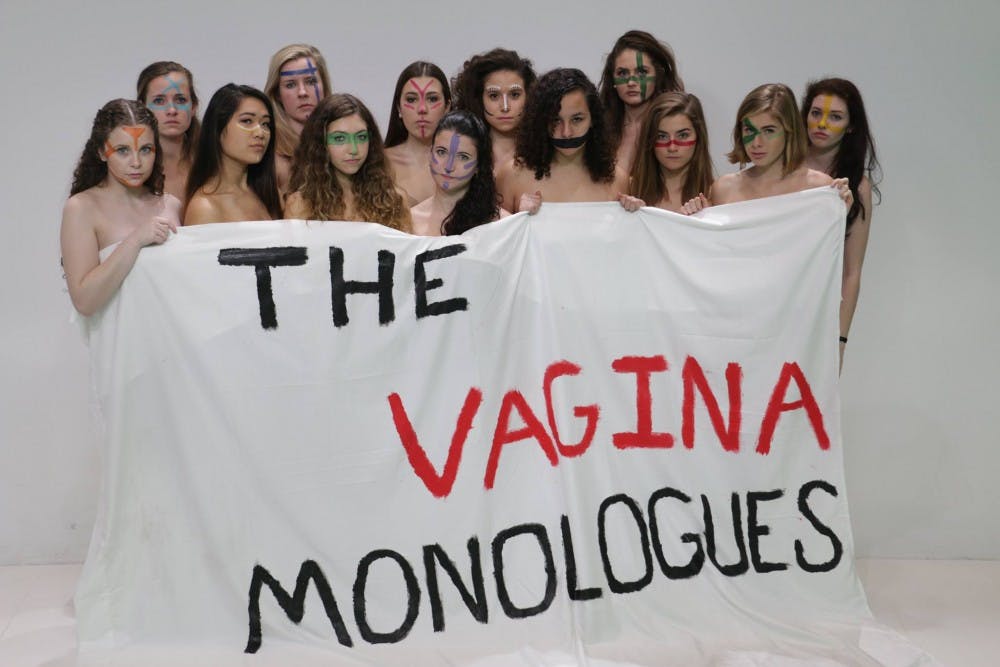The Vagina Monologues has become an annual Valentine’s Day tradition for the Elon University community. This year, while the topic of women’s rights hangs in the air around the country, the performance aims to be even more poignant than in years past.
The Vagina Monologues is a play written by Eve Ensler that premiered in 1996 and is still performed all around the world today. The play consists of monologues that Ensler composed after conducting interviews with more than 200 women about their experiences.
No monologue represents one woman’s experience, but rather the experiences of many.
The Vagina Monologues will run at 6:30 p.m. and 9 p.m. on Feb. 14 in Whitley Auditorium. Tickets are $5. Elon’s production is sponsored by EFFECT and all proceeds will benefit CrossRoads of Alamance County, a sexual assault response and resource center serving the area.
The show is one of the few opportunities on campus for non-majors to audition and perform for the community. Senior Emily Ciuffetelli is directing the show this year and said it is the largest turnout for auditions they’ve ever had — spanning various ages and majors.
Junior Viiu Loub decided to audition on a whim with one of her good friends, with no expectation of getting a role.
“Fun fact: She was the first person cast in the show,” Ciuffetelli said.
After seeing the show her freshman year, Loub said it was, “oddly inspirational.”
“And it’s meant to be,” she said. “But as a freshman in college — I’m already a pretty open and fairly comfortable person — I thought it would just be a cool performance to see. I think a part of the reason it’s so cool is it catches people off guard on how meaningful it is.”
The women have had individual rehearsals with Ciuffetelli since the beginning of Winter Term and have recently started rehearsing as a group.
To promote the event, Ciuffetelli tentatively suggested doing a “faux-nude” photo shoot using strategically placed sheets. And to her surprise, everyone was on board.
“The day that we actually did it, everyone was so body confident and body positive and it helped kind of form a bond,” Ciuffetelli said.
Almost every year, Ensler adds a new monologue to the script or takes one out, but for the first time in a while, she kept the script from last year.
“She kept in the one she added last year which is a monologue with five women and is about the trans experience,” Ciuffetelli said. “From being a young child, through the adversity [and] how they become who they really are. I’m really happy she kept that one in.”
Aside from the words the actors speak during the show, Ciuffetelli hopes the audience will also find meaning in what the actors do when they’re silent.
“They’re all going to be sitting [on stage] the whole time — except the person performing — but the rotation of how they’re sitting is going to change and where they’re looking is going to change,” Ciuffetelli said. “To me, that is representing the world and society’s view of whatever [topic is being discussed]. Do they have their backs turned to it? Are they looking straight on? Are they looking past it?”
Ciuffetelli said preparing for the performance during our current political climate has also given the show a different feel from years past.
“I think it has been a very cathartic thing for me and other people in this time to be able to have this as a form of expression,” she said.
While preparing for her role, Loub said she looked up videos of past productions from around the world and watched her specific monologue various times. Though the words were the same, Loub noticed that each performance was unique.
“Everyone was so different, even in the littlest ways,” she said. “It can make the biggest difference in how that monologue is perceived and how it comes out.”
Ciuffetelli is grateful she got to spend her fourth and final time working on the show as director and watching the actors’ progress through rehearsals.
“No matter what end you participate in the Vagina Monologues, this is — I am willing to say — a life changing experience for anyone who participates,” Ciuffetelli said. “The girls who came in the very first read-through came in uncomfortable about saying ‘vagina’ in front of a lot of people. And just through the individual rehearsals seeing people come into their own and just really accepting their womanhood has been so beautiful.”


